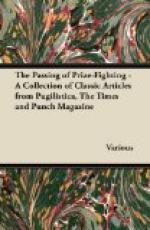The provocation has undoubtedly been intense. It was proved in an article of studied moderation and exquisite taste that the time had come to revise our estimates of bygone grandeur and substitute for the devotion to a Queen of tarnished fame and disastrous tendencies the spontaneous and chivalrous worship of her beneficent and prosperous namesake. Yet in spite of this dignified and convincing appeal no invitation was sent to the one person whose presence at the recent proceedings at Holyrood would have lent them a crowning lustre. The action or inaction of the Lord Chamberlain is inexplicable, except on the assumption that Queen Pickford’s engagement to attend the Spa Conference would have rendered it impossible for her to accept the invitation to Edinburgh. None the less the invitation should have been sent. Besides, the resources of aviation might have surmounted the difficulty. In any case this deplorable oversight has knocked one more nail in the coffin of the Prime Minister.
* * * * *
“At the fifth each played
a magnificent tea shot. Hodgson again
used his favourite spoon.”—Provincial
Paper.
Obviously the right club for the purpose.
* * * * *
“‘The Tongue Can no
Man Tame.’
St. Peter.”
Heading in Daily Paper.
A clear case of robbing James to pay Peter.
* * * * *
ESSENCE OF PARLIAMENT.
Monday, July 12th.—Viscount Curzon’s complaint about “crawling” taxi-cabs was ostensibly based upon the obstruction thus caused to more rapidly moving traffic. But I fancy that it was really due to an inherent belief that the motor-car is a noble creature, only happy when exceeding the speed-limit and dashing through police-controls, and that to compel the poor thing to crawl is “agin natur’” and ought to be dealt with by the R.S.P.C.A.
As usual much of Question-time was devoted to Russian affairs. Colonel Wedgwood wanted to know whether the Cabinet had approved a message from Mr. Churchill to the late Admiral Kolchak, advising him how to commend his Administration to the Prime Minister, who was described in the telegram as “all-powerful, a convinced democrat and particularly devoted to advanced views on the land question.” Mr. Law, while provisionally promising a Blue-book on Siberia, declined to pick out a single message from a whole bunch.
The news that the Soviet Government had accepted the British conditions with regard to the resumption of trade and had thereupon been requested to conclude an armistice with Poland did not seem particularly welcome to any section of the House. Those whom Mr. Stanton in stentorian whispers daily describes as the “Bolshies” evidently feared that the request had been accompanied by a threat, while others were horrified at the idea of recognising the present regime in Russia, and drew from Mr. Law a hasty disclaimer. The House as a whole would, I think, have liked to learn how you can do business with a person whom you do not recognise?




